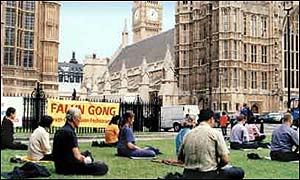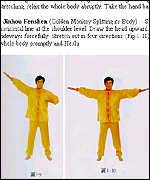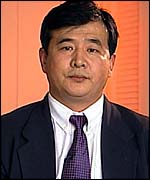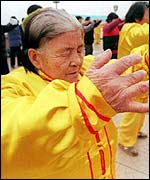BBC: Falun Gong in the UK
Thursday, 14 February, 2002

Falun
Gong has up to 300 adherents in the UK
The Chinese-based Falun Gong movement came to prominence in China in 1992, and arrived in Britain in 1996 when Peter Jauhal read about it on the internet.
Mr Jauhal, 39, who lives in Richmond in Surrey, estimates there are now two to three hundred practitioners in the UK.
He says Falun Gong is mainly spread through word-of-mouth, and is more appealing in several ways than other similar movements.
"It appealed to me because it was free, its teachings were written down - not hidden and gradually revealed by some teacher - and you could do it on your own," he told BBC News Online.

Teachings and exercises are available free on the web
"I'd practised other similar systems before, but a lot of them seemed a bit dodgy, with people making money," he said.
Falun Gong's aims are to improve mind, body and spirit through gentle exercises and meditation.
It also has a higher aim of spiritual enlightenment and, ultimately - through reincarnation - a kind of nirvana (heaven).
Mr Jauhal explained that the system bears similarities to eastern practices like tai chi, and more specifically yoga.
He said he noticed beneficial effects almost immediately he and his wife began practising.
"I had lots of energy, all my stress went. I'd been suffering severe acne for eight years - the doctors had been giving me stronger and stronger antibiotics, but it disappeared within a month.

Practitioners follow the teachings of leader Li Hongzhi
"I'm a management consultant and had a pretty stressful job, I had quite a lot of sleepless nights because if something went wrong it would cost the company a lot of money."
"It took all the stress away, I started sleeping better, and since then I've been promoted many times, so it's had a direct beneficial effect on my career."
Mr Jauhal says he tries to abide by another aspect of Falun Gong, which is to try to live according to the slogan "truthfulness, compassion and forbearance".
"I used to be very selfish, I would follow my own interests - that's quite stressful. Since I started following kindness, tolerance, all that stuff, I've been much more successful."

The exercises are gentle and comparatively simple
The third aspect of Falun Gong is to follow the teachings of Chinese leader Li Hongzhi - who now lives in the US - which are available in books or on the internet.
Mr Jauhal concedes that to the uninitiated, some of Mr Li's teachings could seem a little strange.
"I had a math degree and I had a very logical mind. When I first read his teachings I believed about 80% of them.
"But after you've been practising a while they gradually start to make sense."
He added that Mr Li is not considered a deity, and is not worshipped - he is more akin to a conduit for ancient knowledge.
Mr Jauhal said the exercises are ideally performed on a daily basis. They do not demand high fitness levels - one UK practitioner uses a wheelchair.
Classes are held once a week at various "practice sites" across the UK - usually parks or rooms in buildings such as universities - and volunteers can usually be found to teach meditation and exercises[...].
http://news.bbc.co.uk/hi/english/uk/newsid_1820000/1820061.stm